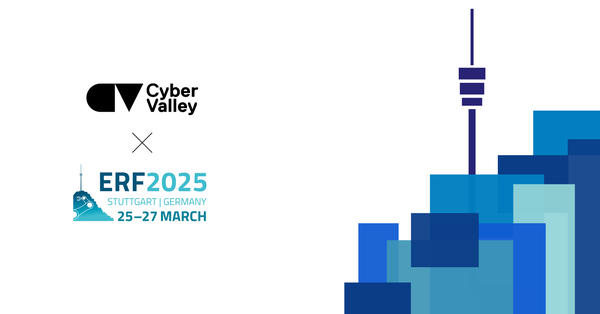European Robotics Forum 2025 (ERF2025)
Cyber Valley co-hosts the 16th edition of ERF in Stuttgart

On behalf of the ERF Programme Committee and the ERF Scientific Board, we invite you to contribute to the 16th edition of the European Robotics Forum (ERF2025). The conference will take place on March 25–27, 2025 in Stuttgart, Germany.
The European Robotics Forum is the most influential meeting of the robotics community in Europe, spanning academia, industry, and society. It fosters communication and knowledge transfer, encompassing robotics technology, its application, and its impact. The ERF provides a podium to discuss recent and future advances in robotics in the context of applications, societal impact, and ethical and legal considerations. The conference covers topics including mechatronics, control, perception, and cognition, alongside the use of AI and data with robotics.
Research on the applications of robotics and AI in industry is leading to fast-growing innovation in Europe. It is therefore increasingly important to foster discussion between researchers and industry to drive the future of research and industrial innovation.
At the ERF 2024 in Rimini, Italy, an industrial scientific track for strengthening the scientific component of ERF was introduced. Thanks to the success of the scientific track, it will be continued at the ERF 2025. The scientific track comprises peer-reviewed papers, which will subsequently be published in a Springer book. To foster discussion between researcher and industry, the contributions of the scientific track will be presented in an “oral” or a “pitch and poster” format, depending on the paper's content.
Subject Areas of the Scientific Track
The scientific track has two subject areas: Robotics and AI for Robotics.
Robotics
This subject area focuses on robotics topics, including but not limited to:
- Autonomous navigation
- Robotic manipulation and control
- Sensor integration and perception
- Mobile robotics and navigation
- Human-robot interaction
- Collaborative Robotics
- Robotics in manufacturing and automation
- Robot kinematics and dynamics
- Mechatronics
- Soft robotics
- Safety and standardization
- Application domains like industry and manufacturing, agriculture and food, maintenance and inspection, healthcare, logistics and transportation, just to name a few.
AI for Robotics
This subject area addresses AI solutions specifically designed for robotics applications, covering areas such as:
- Machine learning and deep learning for robotics
- Foundation models and generative AI for robotics
- Autonomous decision-making and planning
- Computer vision and image processing
- Natural language processing for robotics
- Reinforcement learning and adaptive systems
- AI-driven robot collaboration and coordination
- Dependable and safe AI systems
- Hybrid and informed AI for robotics
Paper Preparation
Contributions must be maximum 6 pages including references, single-column, and in PDF format. They must be assigned to one subject area during submission. Please be aware that the ERF Scientific Board reserves the right to assign accepted contributions to another subject area if its content fits better.
Contributions will be peer-reviewed in single-blind fashion. Accepted contributions will be published in the indexed Springer Proceedings in Advanced Robotics (SPAR) with series editors Bruno Siciliano and Oussama Khatib.
Please prepare your contribution in standard Springer Proceedings in Advanced Robotics (SPAR) format, available here in Latex and Word templates. The authors’ guidelines for the preparation of contributions come with templates.
Submission and Important Dates
- Contributions for the Scientific Track can be submitted here (registration on Microsoft CMT necessary):
https://cmt3.research.microsoft.com/ERF2025 - Deadline for contribution submission: September 30, 2024 (12:00 PM CET)
- Notification of Acceptance: November 15, 2024
- Final Submission: December 15, 2024
We're looking forward to receiving your contribution to ERF 2025!
Dr. Werner Kraus – General Chair, Fraunhofer IPA, Germany
Rebecca Reisch – General Co-Chair, Cyber Valley, Germany
Dr. Matthias Peissner – General Co-Chair, Fraunhofer IAO, Germany
Prof. Dr. Alexander Verl – Scientific Track Chair, University of Stuttgart, Germany
Prof. Dr. Marco Huber – Scientific Track Chair, University of Stuttgart & Fraunhofer IPA, Germany
Related Articles

Stuttgart to become Europe's hot spot for AI and robotics...

Cyber Valley: World's first ELLIS Institute opens
